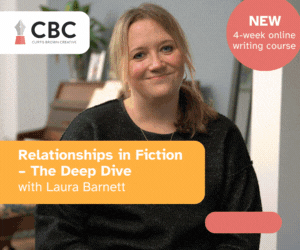Hints & Tips For New Writers #5
14 May 2018


So, I’ve had a change of plan. I know last month I said I was going to talk about getting started, but looking around, I saw there were already so many great blogs on that subject that I thought I’d tackle a more practical one today instead. Otherwise known as –
How Not to Damage your Body while Writing
George Orwell described writing a book as, ‘a horrible exhausting struggle, like a long bout of some painful illness.’ I have to say, I agree. Writing isn’t just a mental and emotional strain. It takes a huge toll on your body too. When a deadline looms, a lot of us start to rely on junk food, don’t get enough sleep or water and generally spend too much time sitting down.
We all know this is counterproductive, but under pressure, that can be really hard to remember. But don’t worry, this isn’t a lecture about healthy eating because I’m not that much of a hypocrite. Instead, I’m going to talk about, gulp…
Exercise!
If you spend a lot of time writing, you’re probably aware of that tight feeling in your chest that comes from hunching over a keyboard, not to mention numb-bum syndrome (technically a strain of your piriformis) from being sedentary all day.
I’ve just finished writing a book, which means that my shoulder blades were, according to my sports therapist friend Ruth, ‘all over the place’, and the less said about my neck the better. I’d reached a point where I could hear crunching in my ears every time I turned my head. I’m lucky to be reasonably healthy enough that Ruth was able to fix me again, but if I’m not careful, I run a greater risk of developing RSI, diabetes, obesity, heart disease and arthritis. Which is pretty scary – and did I mention, these are just the physical problems associated with writing?
The good news is that we can do something to reduce those risks. My friend, Mills & Boon writer Harper St. George, is way ahead of me, having recently invested in a treadmill desk. This is what she thinks –
I’ve been using my treadmill desk for about two months and I love it. I use it in the mornings and am logging around 15 miles of walking-while-writing per week, though my short-term goal is to reach 20 miles a week. Right now my speed is around 1.5 miles per hour. I opted for a desk that I can easily raise and lower, so I just lower it and pull up my chair when I get tired of walking.
Before using the desk I would get a lot of back and shoulder pain and stiffness from being hunched over my keyboard all the time, but I’ve found that the treadmill desk has helped to improve my posture so that I’m not in that awkward position all the time. I also think that it’s improved my productivity. There’s something about having my body moving that sets the wheels in my head in motion.
I’m pretty much convinced, but if you can’t get your head around the idea of standing up and writing, there are still plenty of exercises that can help relieve the symptoms of over-sitting. Unfortunately, I can’t give you actual examples in case one of you hurts yourself, but I can say what works for me (whilst adding a disclaimer about consulting your doctor before starting and remembering to drink lots of fluids…)
Stretching
Sometimes I find myself actually craving yoga because when you’re shortening and contracting your muscles so frequently, you need to stretch and lengthen them again too. Even small things can make a big difference, like twirling your fingers and wrists around every so often and making sure you get up and walk about every hour. (This shouldn’t be hard because if you’re a writer you’re going to need caffeine that often anyway, but if you can combine it with some light weight-lifting, that would be great!) It also helps to lie on the floor with a cushion under your back to open up the chest area that’s been, essentially, squished.
Finally, I need to talk about bottoms. Which leads to two of my least favourite words in the entire English language. Lunges and squats. They’re horrible, they hurt, and I only make a token effort because I prefer another form of exercise –
Walking
I know it’s not very exciting, but walking doesn’t strain anything and it has the added benefit of being a tried-and-tested method of artistic inspiration. Nietzsche famously claimed that, ‘All truly great thoughts are conceived by walking’, and a recent study from Stanford University demonstrated that in tasks requiring imagination, walking actually leads to more creative thinking than sitting (cited in Psychology Today).
A lot of famous writers agree. Aristotle used to deliver lectures while walking around, Wordsworth must have covered the entire Lake District, and Dickens frequently walked 20-30 miles in a day. As Henry David Thoreau put it, ‘Me thinks that the moment my legs begin to move, my thoughts begin to flow.’
So this month’s tip is a practical one. Get up, have a stretch and/or go for a walk. You don’t need to make your body suffer for your art and, with any luck, it might improve your writing too.
*
 Jenni Fletcher studied English at Cambridge before doing a PhD on Victorian and Edwardian literature at Hull. She’s written four books for Mills & Boon and her fifth is out later this year. If you provide caffeine and sugar, she’s happy to talk about books and/or period dramas all day.
Jenni Fletcher studied English at Cambridge before doing a PhD on Victorian and Edwardian literature at Hull. She’s written four books for Mills & Boon and her fifth is out later this year. If you provide caffeine and sugar, she’s happy to talk about books and/or period dramas all day.




